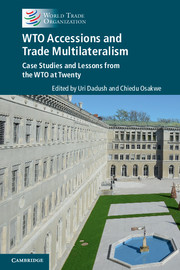Book contents
- Frontmatter
- Dedication
- Contents
- List of contributors
- Foreword
- Acknowledgements
- List of abbreviations
- Editors' note
- PART I WTO accessions, the trading system and the global economy
- PART II Overview: systemic outcomes from accessions
- PART III Members’ perspectives on accession negotiations
- PART IV Working party chairpersons’ perspectives on accession negotiations
- PART V Salient features inWTOAccession Protocols
- 29 Market access goods negotiations: salience, results and meaning
- 30 Services market opening: salience, results and meaning
- 31 WTO accession and the private sector: the nexus of rules and market opportunities
- 32 WTO accession and accession to the Agreement on Government Procurement: what is the relationship? Why should WTO acceding governments also consider GPA accession?
- 33 Energy-related rules in Accession Protocols: where are they?
- 34 Domestic framework for making and enforcing policies
- 35 Export duty commitments: the treaty dialogue and the pattern of commitments
- 36 Disciplining state trading practices: lessons from WTO accession negotiations
- 37 Intellectual property rights protection: the plus/minus debate from a least-developed country perspective – sense and nonsense
- 38 The future of multilateral investment rules in the WTO: contributions from WTO accession outcomes
- 39 Sanitary and phytosanitary measures: trends in accession plurilateral negotiations
- 40 Strengthening transparency in the multilateral trading system: the contribution of the WTO accession process
- PART VI Conclusion
- Annex: Contributor biographies
- Index
- Plate section
30 - Services market opening: salience, results and meaning
from PART V - Salient features inWTOAccession Protocols
Published online by Cambridge University Press: 05 November 2015
- Frontmatter
- Dedication
- Contents
- List of contributors
- Foreword
- Acknowledgements
- List of abbreviations
- Editors' note
- PART I WTO accessions, the trading system and the global economy
- PART II Overview: systemic outcomes from accessions
- PART III Members’ perspectives on accession negotiations
- PART IV Working party chairpersons’ perspectives on accession negotiations
- PART V Salient features inWTOAccession Protocols
- 29 Market access goods negotiations: salience, results and meaning
- 30 Services market opening: salience, results and meaning
- 31 WTO accession and the private sector: the nexus of rules and market opportunities
- 32 WTO accession and accession to the Agreement on Government Procurement: what is the relationship? Why should WTO acceding governments also consider GPA accession?
- 33 Energy-related rules in Accession Protocols: where are they?
- 34 Domestic framework for making and enforcing policies
- 35 Export duty commitments: the treaty dialogue and the pattern of commitments
- 36 Disciplining state trading practices: lessons from WTO accession negotiations
- 37 Intellectual property rights protection: the plus/minus debate from a least-developed country perspective – sense and nonsense
- 38 The future of multilateral investment rules in the WTO: contributions from WTO accession outcomes
- 39 Sanitary and phytosanitary measures: trends in accession plurilateral negotiations
- 40 Strengthening transparency in the multilateral trading system: the contribution of the WTO accession process
- PART VI Conclusion
- Annex: Contributor biographies
- Index
- Plate section
Summary
ABSTRACT
This chapter is structured around three questions. What advances have been made on services market opening? What have been the specific market access commitments of least-developed countries (LDCs)? And what is the progress made with domestic regulation disciplines? This chapter examines the extent to which the services-specific commitments and domestic regulatory disciplines of Article XII members differ from those undertaken by original WTO members at similar levels of development. Although no single indicator exists that can be used to make this comparison, given the textual nature of specific commitments, as opposed to the numerical properties of tariffs, several other possible parameters exist, which could be used alone or in combination to assess such departures. The evidence and patterns in Article XII members' services market access commitments and regulatory state-of-play and advances are examined. The trends and patterns in the depth and sectoral coverage of commitments are identified. The results from accession negotiations on the rules are reviewed with particular focus on how they compare to the envisaged disciplines on domestic regulation under the General Agreement on Trade in Services Article VI:4. Finally, the performance of Article XII LDC members in their WTO accession services negotiations is reviewed. Overall, the evidence indicates that Article XII members' services bindings go further than those of original WTO members.
What advances have been made on market opening commitments?
The General Agreement on Trade in Services (GATS) applies to a very wide range of measures and adopts a broad definition of trade in services. It covers four different ways through which services may be supplied internationally. The ‘trade barriers’ it disciplines often concern measures that governments have adopted ‘behind the border’.
As a counterweight to its wide scope, the GATS is a flexible agreement. It does not require that services trade be universally liberalised. Rather, it is built on the notion of ‘progressive liberalisation’. This means that members choose the degree of services market opening they are prepared to guarantee legally, and that they are meant to improve it progressively, over time, through successive rounds of negotiations. In practice, members select the sectors in which to undertake market opening commitments, the modes of supply through which they wish to liberalise trade and the overall extent of this liberalisation. Members' selections are registered in documents called ‘schedules of specific commitments'.
- Type
- Chapter
- Information
- WTO Accessions and Trade MultilateralismCase Studies and Lessons from the WTO at Twenty, pp. 641 - 663Publisher: Cambridge University PressPrint publication year: 2015
- 2
- Cited by



